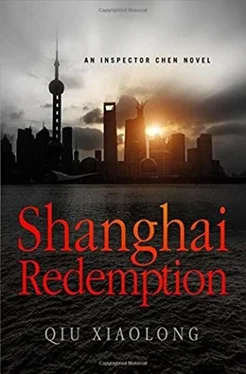He called his mother to tell her about his visit to Suzhou. He made a detailed report about the planned renovation of his father’s tomb and promised to bring the pictures over soon, possibly that evening. She sounded pleased.
Afterward, as he was throwing the paper bowl of the noodles into the trash bin, he started going through the pile of junk mail he’d let collect on his kitchen counter. Among the piles, he found an invitation from White Cloud for the grand opening of her high-end hair salon on West Huaihai Road. The envelope contained a VIP voucher in the amount of five thousand yuan. He’d already missed the event.
He’d met White Cloud on a case several years ago. At that time he was an “emerging cadre”-a man on the rise-and she was a “college/karaoke girl” working in a KTV salon. Afterward, she briefly worked as a “little secretary” for him while he was doing a translation project. They’d kept in touch ever since. On several occasions, she’d been helpful, and he was sure it wasn’t because of his position. She had no need to curry favor with him. This invitation was yet another of her generous gestures.
It really wasn’t easy for a provincial girl, with no connections or background, to become a successful entrepreneur in Shanghai. Now she had her own salon, and on West Huaihai Road at that. The very location spoke volumes. On impulse, he ordered a large bouquet of flowers to be delivered to her salon.
And with that, he was ready to set out.
***
Half an hour later, Chen arrived at the Shanghai Foreign Liaison Office on Shanxi Road.
The visit was related to a recent incident assigned to the Special Case Squad, the so-called dead pig case. The trouble had all started when a British visitor came down with food poisoning from some sausage made with bad pork. Then everything got out of control: pictures of thousands of dead pigs floating down the Huangpu River turned up online, creating an embarrassing international scandal for the Shanghai government. Interpretations and speculations flew around the Internet. People panicked, and there were rumors that there was a plague going around. The government and local farmers denied the rumors repeatedly, but the question remained unanswered: why were there so many dead pigs if there was no plague?
Finally, the matter was sent to the squad as a “special case.” Assuming it was a damage control assignment, Chen had barely looked at it. Still, as Detective Yu had pointed out, it was one of the newest cases. So this morning, Chen was going to make a few inquiries-not in his former role as chief inspector, but in his new one as the director of the Legal Reform Committee. He thought he could come up with a plausible enough pretext to get away with it.
The director of the Shanghai Foreign Liaison Office was a man named Sima, known as a capable, hardworking cadre who started out as an ordinary clerk. He was also rumored to be connected to Internal Security, which would be no surprise given his job. He still managed to keep good working relations with everyone, including Chen, who, as a member of the Shanghai Writers’ Association, sometimes met with Western writers.
In the early days of China’s economic reform, the main function of Sima’s office was to make arrangements for people either coming into or leaving the country. It wasn’t easy in those days for regular Shanghainese to get a passport approved. Applicants had to pass a rigorous political screening. State-arranged junkets abroad, in contrast, were very important to the officials making those government-funded trips, and required swift processing. In recent years, however, making those travel arrangements was no longer an important role of the Foreign Liaison Office. Nowadays people had little trouble getting a passport and international travel approved, and as more and more Western expatriates moved to Shanghai, the work of the office had shifted. Foreigners had to apply for a Shanghai residency permit-something like the United States’ green card-in order to move here. In addition, the office also had some say regarding which foreign enterprises were allowed to set up offices or factories in Shanghai. Rumor had it that director of the Foreign Liaison Office was a lucrative position, but Chen knew better than to be too nosy about such things.
In a spacious office basking in the morning light, Sima stood up with an affable smile and reached out his hand to Chen as he arrived for his unannounced visit.
“Congratulations, Director Chen.”
“For what?”
“Your new position.”
“Come on. Surely you know better, Director Sima.”
“Well, I’ve just read an article from the Associated Press saying that Beijing is determined to give China’s legal system a thorough overhaul. The article said that it’s possible that new judges at the highest level will be appointed. So your transfer to this new position may be another step toward that reform.”
“Really! I’ve not heard anything about that.”
“But it’s possible, right?” Sima said. “What favorable wind brings you here today?”
“Oh, I’m here to familiarize myself with some aspects of my new responsibilities.”
“Great! What can I do for you, Director Chen?”
“To start with something specific, are there any regulations involved in the matter of the dead pigs?” He added in a hurry, “I’m just curious.”
“You mean the dead pig scandal? What a shame that was! I’m not an expert in that sort of thing, but when the scandal broke out, I did look into it. Because there were Westerners involved in the background, as you know. What I found out is that the regulations are vague. Theoretically, the farmers should see to the proper disposal of any livestock that dies, in this case the dead pigs, but that means extra labor and money. It was simply more cost-effective to throw carcasses into the river.”
“Is there any legal recourse? A law requiring proper disposal or a penalty for dumping them in the river like that?”
“None that I know of,” Sima said, shaking his head. He shifted the topic easily. “There are so many foreigners in the city these days that I really have my work cut out for me. It’s not even possible to effectively control all the hotels.”
“The pig scandal started with a British tourist, right?”
“Oh yes. He actually posted a picture of his hotel meal online, just an hour before he was taken to hospital. From there it just spread like a virus. The Internet can really create trouble. Pictures and blog posts were forwarded and reposted God knows how many times. Someone even posted the patient’s diagnosis from his hospital records. And then, after all that, the pictures of the pig carcasses floating down the river showed up. The city government lost a lot of face, and they had to conduct some sort of internal investigation.”
“Tell me more about that investigation.”
“The dead pigs were traced back to Jiaxing. In the past, farmers there raised only a few pigs, perhaps five or six per family. Pig farming is now a matter of mass production. There are thousands of them, maybe even more, crammed together. They are now raised on chemical feed and whatnot. So naturally there are more sick or dead pigs in the picture. Some ‘entrepreneurs’ saw an opportunity there. They bought the pig carcasses from the farmers for practically nothing, and with their special connections, they sold the pigs to food companies at a slightly lower price. After all, once it was made into sausage, who could tell the difference?”
“Then why were all the dead pigs suddenly floating down the river?”
“The National Party Congress is scheduled for the end of the year. After the British tourist’s bad sausage situation became so public, the city government tried to do something to address food safety issues. They arrested a couple of the businessmen who were selling the dead pigs. Those arrests scared the others, so they simply dumped the remaining pig carcasses into the river.”
Читать дальше












